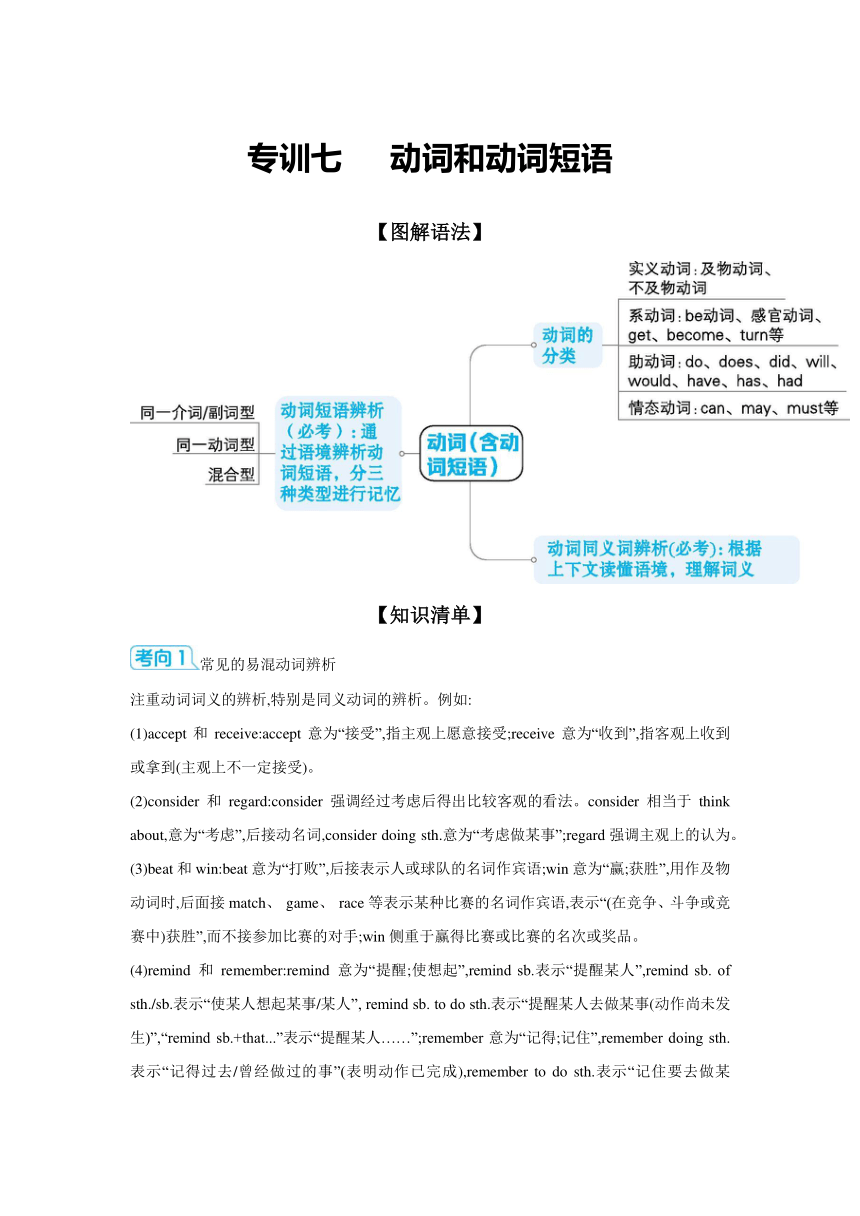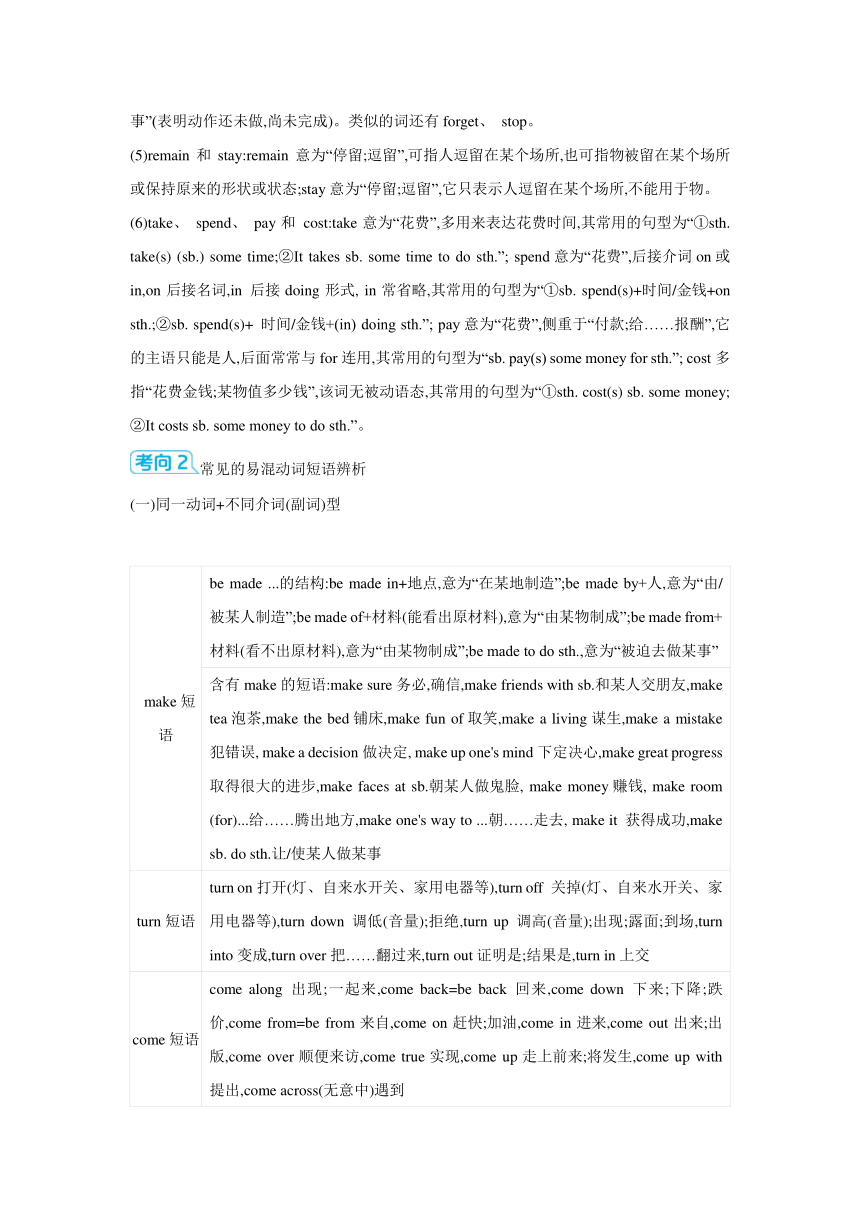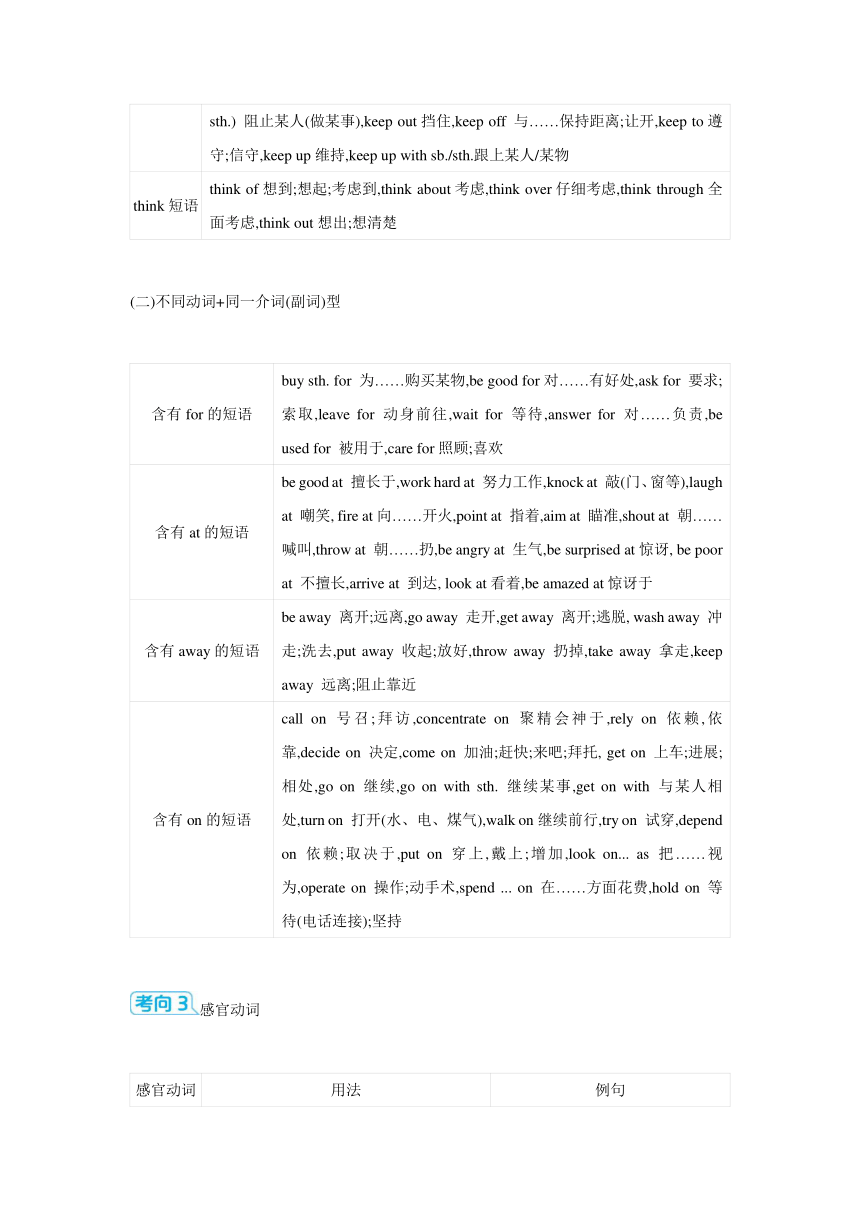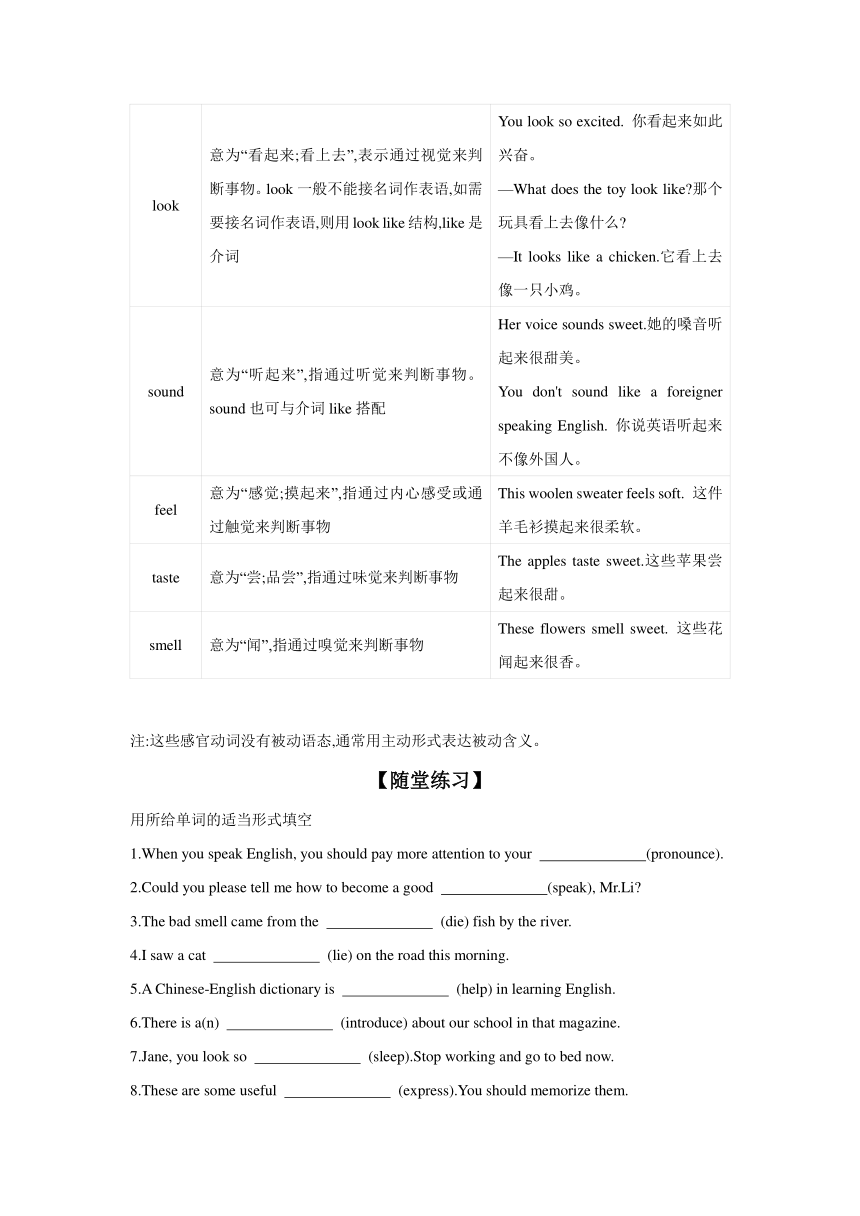专训7 动词和动词短语 2025年中考人教版英语总复习专题训练(河南专版)(含答案)
文档属性
| 名称 | 专训7 动词和动词短语 2025年中考人教版英语总复习专题训练(河南专版)(含答案) |

|
|
| 格式 | docx | ||
| 文件大小 | 118.7KB | ||
| 资源类型 | 教案 | ||
| 版本资源 | 人教新目标(Go for it)版 | ||
| 科目 | 英语 | ||
| 更新时间 | 2024-11-01 16:57:30 | ||
图片预览





文档简介
专训七 动词和动词短语
【图解语法】
【知识清单】
常见的易混动词辨析
注重动词词义的辨析,特别是同义动词的辨析。例如:
(1)accept和receive:accept意为“接受”,指主观上愿意接受;receive意为“收到”,指客观上收到或拿到(主观上不一定接受)。
(2)consider和regard:consider强调经过考虑后得出比较客观的看法。consider相当于think about,意为“考虑”,后接动名词,consider doing sth.意为“考虑做某事”;regard强调主观上的认为。
(3)beat和win:beat意为“打败”,后接表示人或球队的名词作宾语;win意为“赢;获胜”,用作及物动词时,后面接match、 game、 race等表示某种比赛的名词作宾语,表示“(在竞争、斗争或竞赛中)获胜”,而不接参加比赛的对手;win侧重于赢得比赛或比赛的名次或奖品。
(4)remind和remember:remind意为“提醒;使想起”,remind sb.表示“提醒某人”,remind sb. of sth./sb.表示“使某人想起某事/某人”, remind sb. to do sth.表示“提醒某人去做某事(动作尚未发生)”,“remind sb.+that...”表示“提醒某人……”;remember意为“记得;记住”,remember doing sth.表示“记得过去/曾经做过的事”(表明动作已完成),remember to do sth.表示“记住要去做某事”(表明动作还未做,尚未完成)。类似的词还有forget、 stop。
(5)remain和stay:remain意为“停留;逗留”,可指人逗留在某个场所,也可指物被留在某个场所或保持原来的形状或状态;stay意为“停留;逗留”,它只表示人逗留在某个场所,不能用于物。
(6)take、 spend、 pay和 cost:take意为“花费”,多用来表达花费时间,其常用的句型为“①sth. take(s) (sb.) some time;②It takes sb. some time to do sth.”; spend意为“花费”,后接介词on或in,on后接名词,in 后接doing形式, in常省略,其常用的句型为“①sb. spend(s)+时间/金钱+on sth.;②sb. spend(s)+ 时间/金钱+(in) doing sth.”; pay意为“花费”,侧重于“付款;给……报酬”,它的主语只能是人,后面常常与for连用,其常用的句型为“sb. pay(s) some money for sth.”; cost多指“花费金钱;某物值多少钱”,该词无被动语态,其常用的句型为“①sth. cost(s) sb. some money; ②It costs sb. some money to do sth.”。
常见的易混动词短语辨析
(一)同一动词+不同介词(副词)型
make短语 be made ...的结构:be made in+地点,意为“在某地制造”;be made by+人,意为“由/被某人制造”;be made of+材料(能看出原材料),意为“由某物制成”;be made from+材料(看不出原材料),意为“由某物制成”;be made to do sth.,意为“被迫去做某事”
含有make的短语:make sure务必,确信,make friends with sb.和某人交朋友,make tea泡茶,make the bed铺床,make fun of取笑,make a living谋生,make a mistake犯错误, make a decision做决定, make up one's mind下定决心,make great progress取得很大的进步,make faces at sb.朝某人做鬼脸, make money赚钱, make room (for)...给……腾出地方,make one's way to ...朝……走去, make it 获得成功,make sb. do sth.让/使某人做某事
turn短语 turn on打开(灯、自来水开关、家用电器等),turn off 关掉(灯、自来水开关、家用电器等),turn down 调低(音量);拒绝,turn up调高(音量);出现;露面;到场,turn into变成,turn over把……翻过来,turn out证明是;结果是,turn in上交
come短语 come along出现;一起来,come back=be back回来,come down下来;下降;跌价,come from=be from来自,come on赶快;加油,come in进来,come out出来;出版,come over顺便来访,come true实现,come up走上前来;将发生,come up with提出,come across(无意中)遇到
go短语 go for a walk 散步,go home回家,go on继续,go on with/go on doing sth. 继续(做)某事,go on to do sth.继续/接着做另一件事,go to school上学,go shopping/skating去购物/去滑冰,go to bed去睡觉,go over复习,go to sleep去睡觉,go through通过;仔细查看,go back回去,go ahead 前进;进行,go in for参加;从事于,go up上升,go sightseeing去观光旅行,go out外出;到外面,go abroad出国
put短语 put away放好;收起来,put down放下;记下,put off推迟;拖延,put on穿上;演出,put out熄灭,put up张贴;建造;举起(手),put ...into English把……译成英语
look短语 look at看,look after=take care of照顾;照看,look around 四处看看,look like看起来像,look the same看起来一样,look for寻找,look out=take care小心;留意;注意,look out of从……向外看,look up抬头看;仰视;查阅,look on ...as把……看作,look over仔细检查,look forward to期待;期盼,have a look瞧一瞧,看一看(look是名词)
be短语 be able to能;会,be born in 出生于,be different from和……不同,be good at 在……方面(学得)好;擅长……,be good/bad for对……有益/害,be fond of喜欢……,be in hospital 生病住院,be busy doing/with sth.忙于做某事,be afraid of 害怕……, be angry with对……生气,be amazed at对……感到惊奇,be covered with/by被……覆盖,be excited about对……感到兴奋,be famous for 以……闻名,be famous as作为……而闻名,be fed up with对……感到厌恶,be full of充满……,be interested in对……感兴趣,be late for迟到,be satisfied/pleased with对……感到满意,be proud of以……自豪,be used for被用作,be ready to do sth.准备做某事,be ready for为……做准备
take短语 take a walk 散步,take away 拿走;夺去,take a train/bus 乘火车/公共汽车,take good care of (相当于look after ...well) 好好照料,take down 取下,take exercise 运动,take off 脱去(衣帽等);(飞机)起飞,take out 拿出;取出,take one's time不急;慢慢来,take turns 替换;轮流,take one's temperature 量体温,take a picture/photo 照相,take a rest 休息一下,take medicine 吃药,take an active part in积极参加,take a seat就座;坐下,take a message捎口信,take charge of 负责;掌管,take hold of抓住,take the place of代替,take place发生,take up占据
keep短语 keep (on) doing sth.继续做某事,keep away from避开;不接近, keep sb. from (doing sth.) 阻止某人(做某事),keep out挡住,keep off 与……保持距离;让开,keep to遵守;信守,keep up维持,keep up with sb./sth.跟上某人/某物
think短语 think of想到;想起;考虑到,think about考虑,think over仔细考虑,think through全面考虑,think out想出;想清楚
(二)不同动词+同一介词(副词)型
含有for的短语 buy sth. for 为……购买某物,be good for对……有好处,ask for 要求;索取,leave for 动身前往,wait for 等待,answer for 对……负责,be used for 被用于,care for照顾;喜欢
含有at的短语 be good at 擅长于,work hard at 努力工作,knock at 敲(门、窗等),laugh at 嘲笑, fire at向……开火,point at 指着,aim at 瞄准,shout at 朝……喊叫,throw at 朝……扔,be angry at 生气,be surprised at惊讶, be poor at 不擅长,arrive at 到达, look at看着,be amazed at惊讶于
含有away的短语 be away 离开;远离,go away 走开,get away 离开;逃脱, wash away 冲走;洗去,put away 收起;放好,throw away 扔掉,take away 拿走,keep away 远离;阻止靠近
含有on的短语 call on 号召;拜访,concentrate on 聚精会神于,rely on 依赖,依靠,decide on 决定,come on 加油;赶快;来吧;拜托, get on 上车;进展;相处,go on 继续,go on with sth. 继续某事,get on with 与某人相处,turn on 打开(水、电、煤气),walk on继续前行,try on 试穿,depend on 依赖;取决于,put on 穿上,戴上;增加,look on... as 把……视为,operate on 操作;动手术,spend ... on 在……方面花费,hold on 等待(电话连接);坚持
感官动词
感官动词 用法 例句
look 意为“看起来;看上去”,表示通过视觉来判断事物。look一般不能接名词作表语,如需要接名词作表语,则用look like结构,like是介词 You look so excited. 你看起来如此兴奋。 —What does the toy look like 那个玩具看上去像什么 —It looks like a chicken.它看上去像一只小鸡。
sound 意为“听起来”,指通过听觉来判断事物。sound也可与介词like搭配 Her voice sounds sweet.她的嗓音听起来很甜美。 You don't sound like a foreigner speaking English. 你说英语听起来不像外国人。
feel 意为“感觉;摸起来”,指通过内心感受或通过触觉来判断事物 This woolen sweater feels soft. 这件羊毛衫摸起来很柔软。
taste 意为“尝;品尝”,指通过味觉来判断事物 The apples taste sweet.这些苹果尝起来很甜。
smell 意为“闻”,指通过嗅觉来判断事物 These flowers smell sweet. 这些花闻起来很香。
注:这些感官动词没有被动语态,通常用主动形式表达被动含义。
【随堂练习】
用所给单词的适当形式填空
1.When you speak English, you should pay more attention to your (pronounce).
2.Could you please tell me how to become a good (speak), Mr.Li
3.The bad smell came from the (die) fish by the river.
4.I saw a cat (lie) on the road this morning.
5.A Chinese-English dictionary is (help) in learning English.
6.There is a(n) (introduce) about our school in that magazine.
7.Jane, you look so (sleep).Stop working and go to bed now.
8.These are some useful (express).You should memorize them.
9.The (discover) of Columbus was quite a great event in the world.
10.I am old enough to make my own (decide).
11.It (take) me two hours to get there by bus last weekend.
12.I (spend) half an hour on my homework yesterday.
13.It is raining. (take) the raincoat with you when you go out.
14.I can lend you my dictionary, but you can (keep) it for only a week.
15.Dr.White can (speak) French very well.
16.The man doesn't know how to (translate) this word into English.
17.We'll go to (see) a film instead of (read) a book in bed.
18.When we (get) to the railway station, the train had already left.
19.I (listen) to the teacher, and took notes carefully.
20.We (feel) excited when the football match was over.
【仿真训练】
一、完形填空
A
There was once a very wise man who lived in ancient times.He was elderly and educated.
One day while he was walking, he 1 that his shoes were starting to 2 .He knew he had to buy a new pair.But he didn't want to 3 the wrong size of shoes.He gathered some books and 4 a lot of time reading about how to know if a pair of shoes fitted properly.
Following the books' instructions, the man took a stick and measured his feet with it.He then went to the market.However, he 5 the stick at home, which was far away from the shop, so he went back to get it.
By the time the man returned to the market, the shop had been closed.And by that point, his shoes were completely worn out, so he had to return home barefoot(赤脚的).
The next morning, he walked to the market, but the shoes that he had chosen the day before had been 6 .The shopkeeper asked,“Why didn't you buy the shoes yesterday ”
The wise man 7 , “Because I forgot the stick that I had used to measure my feet at home.And I have to have the correct measurements of my feet before I can buy shoes.I didn't want to buy the wrong size of shoes.”
Even more confused,the shopkeeper asked,“But your feet are always with you.Why didn't you just 8 the shoes ”
The wise man said, “All the books 9 shoes must be bought with the exact same measurements of the shoes you already own.”
The shopkeeper 10 ,“You don't need advice from books to buy shoes.You just need to have your feet, some money, and some common sense instead of making things more difficult.”
( )1.A.realized B.forgot
C.missed D.regarded
( )2.A.get out B.shout out
C.rush out D.wear out
( )3.A.borrow B.buy
C.lend D.send
( )4.A.cost B.took
C.spent D.paid
( )5.A.left B.missed
C.gave D.took
( )6.A.sold out B.given up
C.thrown away D.kept on
( )7.A.used B.replied
C.married D.watched
( )8.A.carry on B.take on
C.try on D.feed on
( )9.A.say B.read
C.talk D.speak
( )10.A.laughed B.cried
C.shouted D.agreed
B(原创)
Monty Roberts was the son of a horse trainer who would go from farm to farm and ranch (大牧场) to ranch to train horses.One day, when he was still in high school, Roberts was asked to 1 on a paper about what he wanted to be in the future.
That night, he wrote a seven-page paper describing his goal of someday owning a horse ranch.He wrote about his dream in great details and even drew pictures of the ranch.
He 2 his heart into the paper and the next day he 3 the paper to his teacher.Two days later, he got his paper back.On the front page was a large red “F” with a note that read, “ 4 me after class.”
Being confused, Roberts went to see his teacher after class and asked, “Why did I 5 an ‘F’ ”
The teacher said, “This is an unrealistic (不切实际的) dream for a young boy like you. You 6 a poor family.Buying a horse ranch 7 a lot of money.It's impossible for you to do it. 8 your dream.”
Roberts went home and thought long and hard.One week later, the boy handed in the same paper, making no changes at all.
He said, “You can keep the ‘F’ but I'll 9 my dream.”
After that, Roberts worked very hard, little by little, and many years later he finally owned a 200-acre horse ranch. He shared his experience with his friends. “I could succeed because I had enough courage not to 10 my dream.Don't let anyone steal your dreams.Follow your heart, no matter what others said.”
( )1.A.write B.read
C.copy D.buy
( )2.A.kept B.put
C.thought D.gave
( )3.A.fell over B.worried about
C.gave away D.handed in
( )4.A.See B.Ask
C.Help D.Thank
( )5.A.give B.receive
C.buy D.spell
( )6.A.come from B.come out
C.come on D.come over
( )7.A.takes B.spends
C.costs D.pays
( )8.A.Keep B.Change
C.Try D.Practice
( )9.A.forget B.break
C.keep D.sell
( )10.A.give up B.give out
C.give off D.give away
二、语篇填空
阅读短文,从方框中选择适当的词并用其正确形式填空,使短文通顺、意思完整。每空限填一词,每词限用一次。
A(原创)
think have ask prevent walk
Once there was a young camel.He 1. his mother many questions, as all children naturally do.
“Mother,why do we have humps (驼峰) on our backs ” he asked.
His mother replied, “My child, these humps prevent hunger and thirst as we go on long journeys through the dry desert.”
“But mother, why do we 2. long eyelashes (睫毛) ” he continued.
“Oh, son, those are to 3. the sand in the desert from hurting our eyes during sandstorms.This protection allows us to continue traveling,” his mother answered patiently.
“And what about our strange feet ” he asked.
“They stop our legs from sinking (下沉) into the soft sand.This lets us 4. more easily and quickly,” his mother replied.
The young camel 5. some more.Then he said, “I see. So the hump is to store water when we are in the desert, the eyelashes protect our eyes from the sand in the desert and these legs are for walking through the desert.So all these traits make us special, right ”
B
last make cover put mean
wear use call shine look
I am an Inuit boy named Kayla.Inuit are the people who live in cold Arctic (北极的) lands.In my language, Inuit 1. “the people”.Some people used to call us Eskimos.We wish to be called Inuit.
I live with my father, mother and two brothers.We live at the most northern part of the world.It is 2. up of the Arctic Ocean and the land. For months the sea is 3. with thick ice.The land is covered with snow and ice most of the year, too.
Winter is long and very cold.It 4. from October to March.It is dark twenty-four hours a day.The sun does not come up to warm the water and land.When the north winds blow, it is even colder.There are days when the temperature is 40℃ below zero.My family is prepared.We wear watertight shoes (防水鞋). We 5. on many layers (层) of clothes.Outside we always 6. a thick warm coat that has fur inside.I'm not afraid of the cold winters.I guess I'm just 7. to them.
My family and I 8. forward to each summer. The temperature usually stays around 10℃. During the summer, the sun 9. all day and night. This is why the Arctic is 10. the “Land of the Midnight Sun”.
【参考答案】
随堂练习
1.pronunciation 2.speaker 3.dead 4.lying
5.helpful 6.introduction 7.sleepy 8.expressions
9.discovery 10.decisions 11.took 12.spent 13.Take
14.keep 15.speak 16.translate 17.see reading
18.got 19.listened 20.felt
仿真作业
一、完形填空
A
1~5 ADBCA 6~10 ABCAA
B
1~5 ABDAB 6~10 ACBCA
二、语篇填空
1.asked 2.have 3.prevent 4.walk 5.thought
B
1.means 2.made 3.covered 4.lasts 5.put 6.wear
7.used 8.look 9.shines 10.called
【图解语法】
【知识清单】
常见的易混动词辨析
注重动词词义的辨析,特别是同义动词的辨析。例如:
(1)accept和receive:accept意为“接受”,指主观上愿意接受;receive意为“收到”,指客观上收到或拿到(主观上不一定接受)。
(2)consider和regard:consider强调经过考虑后得出比较客观的看法。consider相当于think about,意为“考虑”,后接动名词,consider doing sth.意为“考虑做某事”;regard强调主观上的认为。
(3)beat和win:beat意为“打败”,后接表示人或球队的名词作宾语;win意为“赢;获胜”,用作及物动词时,后面接match、 game、 race等表示某种比赛的名词作宾语,表示“(在竞争、斗争或竞赛中)获胜”,而不接参加比赛的对手;win侧重于赢得比赛或比赛的名次或奖品。
(4)remind和remember:remind意为“提醒;使想起”,remind sb.表示“提醒某人”,remind sb. of sth./sb.表示“使某人想起某事/某人”, remind sb. to do sth.表示“提醒某人去做某事(动作尚未发生)”,“remind sb.+that...”表示“提醒某人……”;remember意为“记得;记住”,remember doing sth.表示“记得过去/曾经做过的事”(表明动作已完成),remember to do sth.表示“记住要去做某事”(表明动作还未做,尚未完成)。类似的词还有forget、 stop。
(5)remain和stay:remain意为“停留;逗留”,可指人逗留在某个场所,也可指物被留在某个场所或保持原来的形状或状态;stay意为“停留;逗留”,它只表示人逗留在某个场所,不能用于物。
(6)take、 spend、 pay和 cost:take意为“花费”,多用来表达花费时间,其常用的句型为“①sth. take(s) (sb.) some time;②It takes sb. some time to do sth.”; spend意为“花费”,后接介词on或in,on后接名词,in 后接doing形式, in常省略,其常用的句型为“①sb. spend(s)+时间/金钱+on sth.;②sb. spend(s)+ 时间/金钱+(in) doing sth.”; pay意为“花费”,侧重于“付款;给……报酬”,它的主语只能是人,后面常常与for连用,其常用的句型为“sb. pay(s) some money for sth.”; cost多指“花费金钱;某物值多少钱”,该词无被动语态,其常用的句型为“①sth. cost(s) sb. some money; ②It costs sb. some money to do sth.”。
常见的易混动词短语辨析
(一)同一动词+不同介词(副词)型
make短语 be made ...的结构:be made in+地点,意为“在某地制造”;be made by+人,意为“由/被某人制造”;be made of+材料(能看出原材料),意为“由某物制成”;be made from+材料(看不出原材料),意为“由某物制成”;be made to do sth.,意为“被迫去做某事”
含有make的短语:make sure务必,确信,make friends with sb.和某人交朋友,make tea泡茶,make the bed铺床,make fun of取笑,make a living谋生,make a mistake犯错误, make a decision做决定, make up one's mind下定决心,make great progress取得很大的进步,make faces at sb.朝某人做鬼脸, make money赚钱, make room (for)...给……腾出地方,make one's way to ...朝……走去, make it 获得成功,make sb. do sth.让/使某人做某事
turn短语 turn on打开(灯、自来水开关、家用电器等),turn off 关掉(灯、自来水开关、家用电器等),turn down 调低(音量);拒绝,turn up调高(音量);出现;露面;到场,turn into变成,turn over把……翻过来,turn out证明是;结果是,turn in上交
come短语 come along出现;一起来,come back=be back回来,come down下来;下降;跌价,come from=be from来自,come on赶快;加油,come in进来,come out出来;出版,come over顺便来访,come true实现,come up走上前来;将发生,come up with提出,come across(无意中)遇到
go短语 go for a walk 散步,go home回家,go on继续,go on with/go on doing sth. 继续(做)某事,go on to do sth.继续/接着做另一件事,go to school上学,go shopping/skating去购物/去滑冰,go to bed去睡觉,go over复习,go to sleep去睡觉,go through通过;仔细查看,go back回去,go ahead 前进;进行,go in for参加;从事于,go up上升,go sightseeing去观光旅行,go out外出;到外面,go abroad出国
put短语 put away放好;收起来,put down放下;记下,put off推迟;拖延,put on穿上;演出,put out熄灭,put up张贴;建造;举起(手),put ...into English把……译成英语
look短语 look at看,look after=take care of照顾;照看,look around 四处看看,look like看起来像,look the same看起来一样,look for寻找,look out=take care小心;留意;注意,look out of从……向外看,look up抬头看;仰视;查阅,look on ...as把……看作,look over仔细检查,look forward to期待;期盼,have a look瞧一瞧,看一看(look是名词)
be短语 be able to能;会,be born in 出生于,be different from和……不同,be good at 在……方面(学得)好;擅长……,be good/bad for对……有益/害,be fond of喜欢……,be in hospital 生病住院,be busy doing/with sth.忙于做某事,be afraid of 害怕……, be angry with对……生气,be amazed at对……感到惊奇,be covered with/by被……覆盖,be excited about对……感到兴奋,be famous for 以……闻名,be famous as作为……而闻名,be fed up with对……感到厌恶,be full of充满……,be interested in对……感兴趣,be late for迟到,be satisfied/pleased with对……感到满意,be proud of以……自豪,be used for被用作,be ready to do sth.准备做某事,be ready for为……做准备
take短语 take a walk 散步,take away 拿走;夺去,take a train/bus 乘火车/公共汽车,take good care of (相当于look after ...well) 好好照料,take down 取下,take exercise 运动,take off 脱去(衣帽等);(飞机)起飞,take out 拿出;取出,take one's time不急;慢慢来,take turns 替换;轮流,take one's temperature 量体温,take a picture/photo 照相,take a rest 休息一下,take medicine 吃药,take an active part in积极参加,take a seat就座;坐下,take a message捎口信,take charge of 负责;掌管,take hold of抓住,take the place of代替,take place发生,take up占据
keep短语 keep (on) doing sth.继续做某事,keep away from避开;不接近, keep sb. from (doing sth.) 阻止某人(做某事),keep out挡住,keep off 与……保持距离;让开,keep to遵守;信守,keep up维持,keep up with sb./sth.跟上某人/某物
think短语 think of想到;想起;考虑到,think about考虑,think over仔细考虑,think through全面考虑,think out想出;想清楚
(二)不同动词+同一介词(副词)型
含有for的短语 buy sth. for 为……购买某物,be good for对……有好处,ask for 要求;索取,leave for 动身前往,wait for 等待,answer for 对……负责,be used for 被用于,care for照顾;喜欢
含有at的短语 be good at 擅长于,work hard at 努力工作,knock at 敲(门、窗等),laugh at 嘲笑, fire at向……开火,point at 指着,aim at 瞄准,shout at 朝……喊叫,throw at 朝……扔,be angry at 生气,be surprised at惊讶, be poor at 不擅长,arrive at 到达, look at看着,be amazed at惊讶于
含有away的短语 be away 离开;远离,go away 走开,get away 离开;逃脱, wash away 冲走;洗去,put away 收起;放好,throw away 扔掉,take away 拿走,keep away 远离;阻止靠近
含有on的短语 call on 号召;拜访,concentrate on 聚精会神于,rely on 依赖,依靠,decide on 决定,come on 加油;赶快;来吧;拜托, get on 上车;进展;相处,go on 继续,go on with sth. 继续某事,get on with 与某人相处,turn on 打开(水、电、煤气),walk on继续前行,try on 试穿,depend on 依赖;取决于,put on 穿上,戴上;增加,look on... as 把……视为,operate on 操作;动手术,spend ... on 在……方面花费,hold on 等待(电话连接);坚持
感官动词
感官动词 用法 例句
look 意为“看起来;看上去”,表示通过视觉来判断事物。look一般不能接名词作表语,如需要接名词作表语,则用look like结构,like是介词 You look so excited. 你看起来如此兴奋。 —What does the toy look like 那个玩具看上去像什么 —It looks like a chicken.它看上去像一只小鸡。
sound 意为“听起来”,指通过听觉来判断事物。sound也可与介词like搭配 Her voice sounds sweet.她的嗓音听起来很甜美。 You don't sound like a foreigner speaking English. 你说英语听起来不像外国人。
feel 意为“感觉;摸起来”,指通过内心感受或通过触觉来判断事物 This woolen sweater feels soft. 这件羊毛衫摸起来很柔软。
taste 意为“尝;品尝”,指通过味觉来判断事物 The apples taste sweet.这些苹果尝起来很甜。
smell 意为“闻”,指通过嗅觉来判断事物 These flowers smell sweet. 这些花闻起来很香。
注:这些感官动词没有被动语态,通常用主动形式表达被动含义。
【随堂练习】
用所给单词的适当形式填空
1.When you speak English, you should pay more attention to your (pronounce).
2.Could you please tell me how to become a good (speak), Mr.Li
3.The bad smell came from the (die) fish by the river.
4.I saw a cat (lie) on the road this morning.
5.A Chinese-English dictionary is (help) in learning English.
6.There is a(n) (introduce) about our school in that magazine.
7.Jane, you look so (sleep).Stop working and go to bed now.
8.These are some useful (express).You should memorize them.
9.The (discover) of Columbus was quite a great event in the world.
10.I am old enough to make my own (decide).
11.It (take) me two hours to get there by bus last weekend.
12.I (spend) half an hour on my homework yesterday.
13.It is raining. (take) the raincoat with you when you go out.
14.I can lend you my dictionary, but you can (keep) it for only a week.
15.Dr.White can (speak) French very well.
16.The man doesn't know how to (translate) this word into English.
17.We'll go to (see) a film instead of (read) a book in bed.
18.When we (get) to the railway station, the train had already left.
19.I (listen) to the teacher, and took notes carefully.
20.We (feel) excited when the football match was over.
【仿真训练】
一、完形填空
A
There was once a very wise man who lived in ancient times.He was elderly and educated.
One day while he was walking, he 1 that his shoes were starting to 2 .He knew he had to buy a new pair.But he didn't want to 3 the wrong size of shoes.He gathered some books and 4 a lot of time reading about how to know if a pair of shoes fitted properly.
Following the books' instructions, the man took a stick and measured his feet with it.He then went to the market.However, he 5 the stick at home, which was far away from the shop, so he went back to get it.
By the time the man returned to the market, the shop had been closed.And by that point, his shoes were completely worn out, so he had to return home barefoot(赤脚的).
The next morning, he walked to the market, but the shoes that he had chosen the day before had been 6 .The shopkeeper asked,“Why didn't you buy the shoes yesterday ”
The wise man 7 , “Because I forgot the stick that I had used to measure my feet at home.And I have to have the correct measurements of my feet before I can buy shoes.I didn't want to buy the wrong size of shoes.”
Even more confused,the shopkeeper asked,“But your feet are always with you.Why didn't you just 8 the shoes ”
The wise man said, “All the books 9 shoes must be bought with the exact same measurements of the shoes you already own.”
The shopkeeper 10 ,“You don't need advice from books to buy shoes.You just need to have your feet, some money, and some common sense instead of making things more difficult.”
( )1.A.realized B.forgot
C.missed D.regarded
( )2.A.get out B.shout out
C.rush out D.wear out
( )3.A.borrow B.buy
C.lend D.send
( )4.A.cost B.took
C.spent D.paid
( )5.A.left B.missed
C.gave D.took
( )6.A.sold out B.given up
C.thrown away D.kept on
( )7.A.used B.replied
C.married D.watched
( )8.A.carry on B.take on
C.try on D.feed on
( )9.A.say B.read
C.talk D.speak
( )10.A.laughed B.cried
C.shouted D.agreed
B(原创)
Monty Roberts was the son of a horse trainer who would go from farm to farm and ranch (大牧场) to ranch to train horses.One day, when he was still in high school, Roberts was asked to 1 on a paper about what he wanted to be in the future.
That night, he wrote a seven-page paper describing his goal of someday owning a horse ranch.He wrote about his dream in great details and even drew pictures of the ranch.
He 2 his heart into the paper and the next day he 3 the paper to his teacher.Two days later, he got his paper back.On the front page was a large red “F” with a note that read, “ 4 me after class.”
Being confused, Roberts went to see his teacher after class and asked, “Why did I 5 an ‘F’ ”
The teacher said, “This is an unrealistic (不切实际的) dream for a young boy like you. You 6 a poor family.Buying a horse ranch 7 a lot of money.It's impossible for you to do it. 8 your dream.”
Roberts went home and thought long and hard.One week later, the boy handed in the same paper, making no changes at all.
He said, “You can keep the ‘F’ but I'll 9 my dream.”
After that, Roberts worked very hard, little by little, and many years later he finally owned a 200-acre horse ranch. He shared his experience with his friends. “I could succeed because I had enough courage not to 10 my dream.Don't let anyone steal your dreams.Follow your heart, no matter what others said.”
( )1.A.write B.read
C.copy D.buy
( )2.A.kept B.put
C.thought D.gave
( )3.A.fell over B.worried about
C.gave away D.handed in
( )4.A.See B.Ask
C.Help D.Thank
( )5.A.give B.receive
C.buy D.spell
( )6.A.come from B.come out
C.come on D.come over
( )7.A.takes B.spends
C.costs D.pays
( )8.A.Keep B.Change
C.Try D.Practice
( )9.A.forget B.break
C.keep D.sell
( )10.A.give up B.give out
C.give off D.give away
二、语篇填空
阅读短文,从方框中选择适当的词并用其正确形式填空,使短文通顺、意思完整。每空限填一词,每词限用一次。
A(原创)
think have ask prevent walk
Once there was a young camel.He 1. his mother many questions, as all children naturally do.
“Mother,why do we have humps (驼峰) on our backs ” he asked.
His mother replied, “My child, these humps prevent hunger and thirst as we go on long journeys through the dry desert.”
“But mother, why do we 2. long eyelashes (睫毛) ” he continued.
“Oh, son, those are to 3. the sand in the desert from hurting our eyes during sandstorms.This protection allows us to continue traveling,” his mother answered patiently.
“And what about our strange feet ” he asked.
“They stop our legs from sinking (下沉) into the soft sand.This lets us 4. more easily and quickly,” his mother replied.
The young camel 5. some more.Then he said, “I see. So the hump is to store water when we are in the desert, the eyelashes protect our eyes from the sand in the desert and these legs are for walking through the desert.So all these traits make us special, right ”
B
last make cover put mean
wear use call shine look
I am an Inuit boy named Kayla.Inuit are the people who live in cold Arctic (北极的) lands.In my language, Inuit 1. “the people”.Some people used to call us Eskimos.We wish to be called Inuit.
I live with my father, mother and two brothers.We live at the most northern part of the world.It is 2. up of the Arctic Ocean and the land. For months the sea is 3. with thick ice.The land is covered with snow and ice most of the year, too.
Winter is long and very cold.It 4. from October to March.It is dark twenty-four hours a day.The sun does not come up to warm the water and land.When the north winds blow, it is even colder.There are days when the temperature is 40℃ below zero.My family is prepared.We wear watertight shoes (防水鞋). We 5. on many layers (层) of clothes.Outside we always 6. a thick warm coat that has fur inside.I'm not afraid of the cold winters.I guess I'm just 7. to them.
My family and I 8. forward to each summer. The temperature usually stays around 10℃. During the summer, the sun 9. all day and night. This is why the Arctic is 10. the “Land of the Midnight Sun”.
【参考答案】
随堂练习
1.pronunciation 2.speaker 3.dead 4.lying
5.helpful 6.introduction 7.sleepy 8.expressions
9.discovery 10.decisions 11.took 12.spent 13.Take
14.keep 15.speak 16.translate 17.see reading
18.got 19.listened 20.felt
仿真作业
一、完形填空
A
1~5 ADBCA 6~10 ABCAA
B
1~5 ABDAB 6~10 ACBCA
二、语篇填空
1.asked 2.have 3.prevent 4.walk 5.thought
B
1.means 2.made 3.covered 4.lasts 5.put 6.wear
7.used 8.look 9.shines 10.called
同课章节目录
- 词法
- 名词
- 动词和动词短语
- 动词语态
- 动词时态
- 助动词和情态动词
- 非谓语动词
- 冠词
- 代词
- 数词和量词
- 形容词副词及其比较等级
- 介词和介词短语
- 连词和感叹词
- 构词法
- 相似、相近词比较
- 句法
- 陈述句
- 一般疑问句和否定疑问句
- 特殊疑问句及选择疑问句
- 反意疑问句
- 存在句(There be句型)
- 宾语从句
- 定语从句
- 状语从句
- 主谓一致问题
- 简单句
- 并列句
- 复合句
- 主谓一致
- 主、表语从句
- 名词性从句
- 直接引语和间接引语
- 虚拟语气
- 感叹句
- 强调句
- 倒装句
- 祈使句
- 句子的成分
- 句子的分类
- 题型专区
- 单项选择部分
- 易错题
- 完形填空
- 阅读理解
- 词汇练习
- 听说训练
- 句型转换
- 补全对话
- 短文改错
- 翻译
- 书面表达
- 任务型阅读
- 语法填空
- 其他资料
